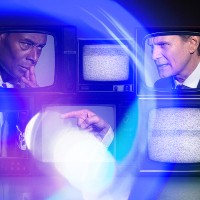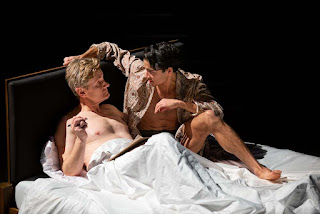As TV moves to all-colour and becomes ubiquitous in most homes, the three major networks cover politics with a commitment to balance, presenting both sides' versions of the story without commentary or opinion. But ABC is lagging far behind the other two networks in the ratings, so news boss Elmer Lower (Kevin McMonagle) takes a punt on a more emotive approach.
On his roundup of the day's events, anchor Howard K. Smith (John Hodgkinson) will welcome a pair of regular guests from opposite ends of the political spectrum, who'll be set against each other on the issues of the day. William F. Buckley Jr (David Harewood) already has his own show on the network, and the fact that his guests include Enoch Powell (Tom Godwin) is a handy shortcut to let a UK audience know just how far to the right his opinions lean (in fact tonight it got a gasp.) To face him from the left, the producers deliberately choose the one person Buckley least wants to see: Gore Vidal (Charles Edwards) was a lifelong friend of the recently-assassinated Kennedy brothers, a not-quite-closeted gay writer whose latest novel Myra Breckinridge caused a stir it was always meant to provoke. Both are intelligent, but where Vidal has a quick wit and depth of knowledge, what he comes up against in Buckley is a brick wall of unshakeable belief.
The first act centres around the Republican convention in Miami, where Vidal largely comes out on top of the argument by correctly guessing Buckley's arrogance will mean he's unprepared to be faced with facts and figures as well as barbs. His mistake is to assume Buckley won't learn from this and come back stronger for the rematch at the Democratic convention in Chicago, where he's done his homework, and has pinpointed which of Vidal's weaknesses to target. As well as moments from the debates themselves, we see the beginnings of pundits forming a strategy behind the scenes, Buckley supported by his wife Patricia (Clare Foster,) Vidal by his long-term, low-key partner (Emilio Doorgasingh) as well as the young aide he's also sleeping with (Sam Otto; at this point you might expect me to do a quip about the scenes where Otto wanders around in his pants, but frankly I can't do better than the one Graham himself provides: "Am I just a dogsbody?" "Yes, but what a body.")
Of course as well as being able to target these surprisingly topical moments from recent history what's made Graham so successful is his ability to make them hugely entertaining, and both the recreations of the TV debates and the behind-the-scenes action are often very funny. Like This House, with which it shares a director in Jeremy Herrin, Best of Enemies keeps its supporting cast busy in multiple roles, in a frantic evocation of 1960s' America. So James Baldwin (Syrus Lowe) commentates on the time and the way the debates are going in an unexpected direction, Aretha Franklin (Justina Kehinde) baffles the Democratic convention by starting the American tradition of singers completely rearranging the national anthem to showcase their vocals, Andy Warhol (Godwin) somehow holds court despite an apparent total lack of brains and charisma, and all the time anti-Vietnam protests build into a crisis on the streets of Chicago.
And the cast playing real public figures are kept on their toes - Bunny Christie's horseshoe-shaped thrust set is dominated by three large screens, on which Luke Halls' video design sometimes projects silent footage of the people they're playing. It's usually a brief flash when they're first introduced, which serves to give the audience a clue of who they are, especially when they're lesser-known names; but it does also have the effect of highlighting the attention to detail that's gone into their performances. This is nowhere more noticeable than in Harewood, as Buckley's awkward and eccentric facial tics and expressions on camera end up becoming a regular target of Vidal's snipes.
Behind these screens we also see the TV Control Room, increasingly misnamed as the pundits get into their stride and the executives lose control of the new discourse they've created. Apparently the source documentary is a fascinating watch in its own right, but Graham and Herrin have created something inherently theatrical in their version. The casting of Harewood as the notably racist Buckley feels like it's not entirely colour-blind: Perhaps a left-leaning Young Vic audience could be expected too easily to dismiss another middle-aged right-wing white man, whereas a black actor with Harewood's gravitas forces us to take in the full unpleasantness of his rhetoric. There's a couple of moments when the modern-day parallels are made a bit too on-the-nose (the dialogue throws in a lot of genuine Vidal witticisms with the fictionalised dialogue, so it's hard to know if he ever predicted Trump and Johnson quite so accurately) but there's only small niggles in a show that yet again sees Graham make a blockbuster out of material that looks unpromising on the page.
Best of Enemies by James Graham, inspired by the documentary by Morgan Neville and Robert Gordon, is booking until the 22nd of January at the Young Vic.
Running time: 2 hours 35 minutes including interval.
Photo credit: Wasi Daniju.






No comments:
Post a Comment